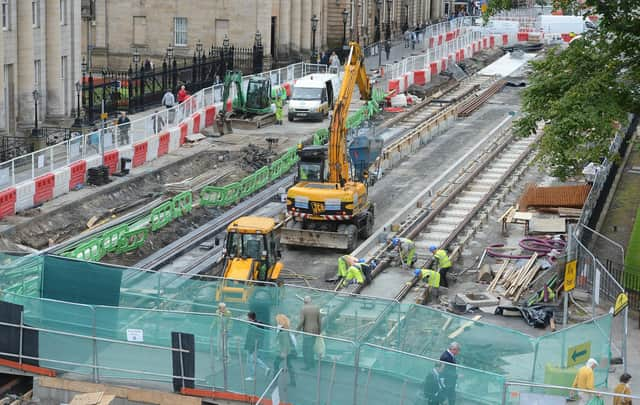Trams are back on the agenda at Edinburgh City Chambers as response to Lord Hardie's tram inquiry considered - Ian Swanson


It was dubbed "hell on wheels", arrived three years late and is still costing Edinburgh council taxpayers £14.3 million every year in loan repayments.
The Capital's tram fiasco is back on the agenda at the City Chambers this week as councillors debate their official response to the report of Lord Hardie's inquiry into what went wrong.
Advertisement
Hide AdAdvertisement
Hide AdIt's almost a decade since the project was last a hot topic at the council and few of the councillors or officials who played key roles are still around. But real damage was done by the mismanagement of the project – lives were disrupted, businesses forced to close and jobs lost. And it also had a serious effect on Edinburgh’s reputation. It may seem a long time ago, but it’s not something to be swept under the carpet and forgotten about.
The council says it broadly accepts Lord Hardie's report, which found "a litany of avoidable failures" and puts much of the blame on the council and particularly its arms-length organisation TIE (Transport Initiatives Edinburgh) which was in charge of the project. The council has already apologised to those adversely affected, but points to the successful delivery of the extension of the line to Newhaven – really just completing the route that was planned in the first place – as evidence that it can, after all, manage major transport infrastructure projects which open on time and within budget.
Recommendations from any inquiry typically prompt the organisations criticised to insist lessons have already been learned and changes made. In this case, the council’s claim to have learned lessons is more convincing because it made sure it had people at Lord Hardie’s inquiry, listening to the evidence and hearing what had gone wrong, and it was able to avoid many of the same mistakes on the Newhaven project.
But while the council has acknowledged its failings, the Scottish Government has been far less willing to accept any blame. As soon as Lord Hardie published his report, Transport Secretary Mairi McAllan was making critical comments. "The inquiry took too long, was too costly, and in some instances the evidence heard does not support the conclusion drawn," she said.
Advertisement
Hide AdAdvertisement
Hide AdAnd in a fuller response earlier this month, she argued against Lord Hardie’s criticism of the decision to withdraw Transport Scotland support for the project in 2007 after the SNP's bid to scrap the project had failed, claiming it was essential to distance the government agency from the management of the project and that the move had avoided any extra Scottish Government funding having to go to the trams. She also insisted many of the changes recommended by Lord Hardie had been implemented "years ago".
Looking to the future, the Scottish Government now seems to have given its backing to the idea that trams have a key role to play in Scotland’s expanding transport infrastructure and the city council is relying on government funding to build new extensions, starting with the proposed line from Granton via the city centre to the Royal Infirmary and beyond.
No doubt there will still be arguments and controversies ahead, but if the model for the next project can be more Newhaven extension than original tram scheme, and the Scottish Government is ready to back it, then everyone will breathe a sigh of relief.
Comment Guidelines
National World encourages reader discussion on our stories. User feedback, insights and back-and-forth exchanges add a rich layer of context to reporting. Please review our Community Guidelines before commenting.